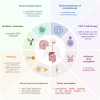Digestive cancers: mechanisms, therapeutics and management
- PMID: 39809756
- PMCID: PMC11733248
- DOI: 10.1038/s41392-024-02097-4
Digestive cancers: mechanisms, therapeutics and management
Abstract
Cancers of the digestive system are major contributors to global cancer-associated morbidity and mortality, accounting for 35% of annual cases of cancer deaths. The etiologies, molecular features, and therapeutic management of these cancer entities are highly heterogeneous and complex. Over the last decade, genomic and functional studies have provided unprecedented insights into the biology of digestive cancers, identifying genetic drivers of tumor progression and key interaction points of tumor cells with the immune system. This knowledge is continuously translated into novel treatment concepts and targets, which are dynamically reshaping the therapeutic landscape of these tumors. In this review, we provide a concise overview of the etiology and molecular pathology of the six most common cancers of the digestive system, including esophageal, gastric, biliary tract, pancreatic, hepatocellular, and colorectal cancers. We comprehensively describe the current stage-dependent pharmacological management of these malignancies, including chemo-, targeted, and immunotherapy. For each cancer entity, we provide an overview of recent therapeutic advancements and research progress. Finally, we describe how novel insights into tumor heterogeneity and immune evasion deepen our understanding of therapy resistance and provide an outlook on innovative therapeutic strategies that will shape the future management of digestive cancers, including CAR-T cell therapy, novel antibody-drug conjugates and targeted therapies.
© 2025. The Author(s).
Conflict of interest statement
Competing interests: The authors declare no competing interests.
Figures







References
-
- Bray, F. et al. Global cancer statistics 2022: GLOBOCAN estimates of incidence and mortality worldwide for 36 cancers in 185 countries. CA Cancer J. Clin.74, 229–263 (2024). - PubMed
-
- Siegel, R. L. et al. Global patterns and trends in colorectal cancer incidence in young adults. Gut68, 2179 LP–2172185 (2019). - PubMed
-
- Matsuda, T. & Saika, K. Cancer burden in Japan based on the latest cancer statistics: need for evidence-based cancer control programs. Ann. Cancer Epidemiol.2, 2–2 (2018).
Publication types
MeSH terms
LinkOut - more resources
Full Text Sources

